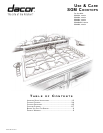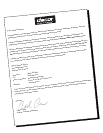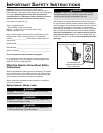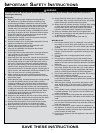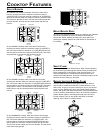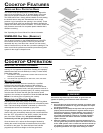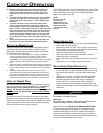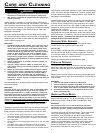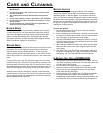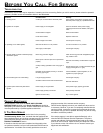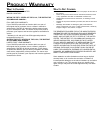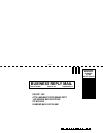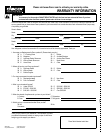
6
7
Care and CleanInG
1. Before cleaning the cooktop, ensure that all burners are turned
off and that all components are cool enough to safely touch.
2. After cleaning, reassemble all components before attempting to
operate the cooktop.
Proper cleaning is necessary to maintain cooktop performance
and appearance, while also ensuring safe operation. The cleaning
effort necessary to maintain the cooktop varies according to the
type and amount of cooking. For example, more frequent cleaning
is required if the cooktop is used often for frying or other high
temperature operations.
Clean the cooktop thoroughly prior to operating it the first time.
For initial and everyday cleaning, use a soft cloth or sponge lightly
dampened with a solution of warm water and hand dishwashing
liquid to clean all components.
IMPORTANT:
1. To keep the cooktop looking its best, clean it after every use as
soon as all components are cool enough to safely touch. Also,
quickly wipe up spills that occur while cooking, being careful
not to touch any hot areas. Spills that remain on hot burner
components will be very difficult to clean, especially if allowed
to burn on. Spills of certain foods, such as tomatoes, citrus
juices, vinegar, alcohol, and milk, are very harmful if allowed
to stand for any length of time. Therefore, save time while also
maintaining a new appearance by cleaning regularly and shortly
after spills occur.
2. Use the mildest cleaner or procedure available to perform the
cleaning operation.
3. Use only a sponge, soft cloth, fibrous or plastic brush, and
nylon pad for cleaning. Avoid the use of abrasive cleaners such
as steel wool.
4. Always dry components completely before using the cooktop.
5. The use of brand names is intended only to indicate a type of
cleaning agent or cleaning implement. All products listed by
name must be used in accordance with the manufacturer’s
recommendations. Use of a brand name does not constitute an
endorsement, nor does omission of a particular brand imply that
a product is inferior.
Recommendations for cleaning specific cooktop components are
summarized below:
IMPORTANT:
The grates, burner caps, and spill-over areas on the cooktop, unlike
other porcelain enamel appliances in your home, are exposed to
extremely high temperatures in a matter of seconds. In addition to
this extreme thermal shock, the grates are subjected to mechanical
shock when utensils are placed on or slid across them. Finally,
spillovers introduce foods with high acidity to all of the porcelain
components. Due to these severe operating conditions, all porcelain
enamel components on the cooktop will undergo an inevitable
change in appearance with use. Meticulous care and cleaning will
slow but not eliminate this natural and expected aging process.
Treating the porcelain components with care will slow the natural
deterioration that takes place with cooktop use. Please follow
these guidelines to keep the porcelain parts looking their best:
1. Do not use utensils having rough bottoms, as this can result in
permanent damage to the top surfaces of the porcelainized grates.
2. Do not drop utensils onto the grates or drag heavy pots across the
tops of the grates.
3. Set the grates into the locating dimples gently. Do not drop the grates
into place.
4. Use caution when cooking to avoid spills as much as possible.
Porcelain is acid-resistant but not acid-proof, so some foods can
cause permanent damage if allowed to remain on porcelain surfaces.
Daily cleaning of the grates and burner caps is best accomplished
with a soft cloth or sponge dampened in a solution of warm water
and hand dishwashing liquid. Grates and burner caps should not
be cleaned in the dishwasher.
Stubborn stains may be removed by applying full-strength sprays
such as Simple Green, Ajax All-Purpose Cleaner, Formula 409,
or Scotch Guard. Metal polishing compounds such as Luneta or
Flitz may also be used. (If you are unable to locate these cleaning
compounds, please phone the DACOR Customer Service
Department for a referral.)
Mildly abrasive cleaners or applicators, such as S.O.S. Pads,
soap-filled steel wool pads, Soft Scrub, or Bon-Ami may be used
with extreme care on occasion to remove the most serious stains.
Exercise caution – extensive use of abrasives will eventually
damage the porcelain enamel surface.
CleanInG tIps
WARNING
Clean these surfaces with the provided Elco Stainless Steel
Cleaner. Rinse and dry with a soft lint-free cloth.
IMPORTANT:
If commercially available stainless steel cleaners are used, it is
important to read the labels for chlorine compounds. Chlorine
is a corrosive substance. If these compounds are present, rinse
thoroughly and dry with a soft lint-free cloth.
Always wipe stainless steel surfaces with the grain.
The black and white models are finished in porcelain enamel.
Clean this surface with a solution of mild detergent and hot water.
Rinse with a soft cloth. Do not use abrasives or commercial oven
cleaners.
Stubborn stains may be removed by applying full-strength sprays
such as Simple Green, Ajax All-Purpose Cleaner, Formula 409, or
Scotch Guard.
IMPORTANT:
1. Never use the cooktop surface as a cutting board.
2. Do not use abrasive cleaners or applicators on the cooktop.
3. Do not try to remove heavy spills with a sharp object such as a
knife or metal spatula. Sharp objects may scratch the cooktop.
4. A small amount of baby oil may be applied to stainless steel
tops to restore the lustre.
staInless steel sUrfaCes
porCelaIn sUrfaCes
The control knobs provided with this cooktop are designed for
ease of use and longevity. The “D” shaped design of the knob
shaft ensures proper orientation when re-installing the knob.
IMPORTANT:
Never block the holes in the control panel beneath the knobs,
because this will impair the flow of combustion air and adversely
affect burner operation, possibly creating a hazardous condition.
The knobs are made of a composite plastic. These components
should be washed regularly in warm, soapy water. Hand
dishwashing liquid is excellent for this task. Knobs should be
removed by gently pulling them straight out and off of the valve
shafts. The spill protectors should be cleaned in place. Use
caution to avoid introduction of moisture into the control panel
behind the bezels. To replace knobs, align the “D-shaped”
opening at the bottom of the knob with the “D-shaped” valve shaft,
then carefully press the knob onto the valve.
knobs and knob bezels



